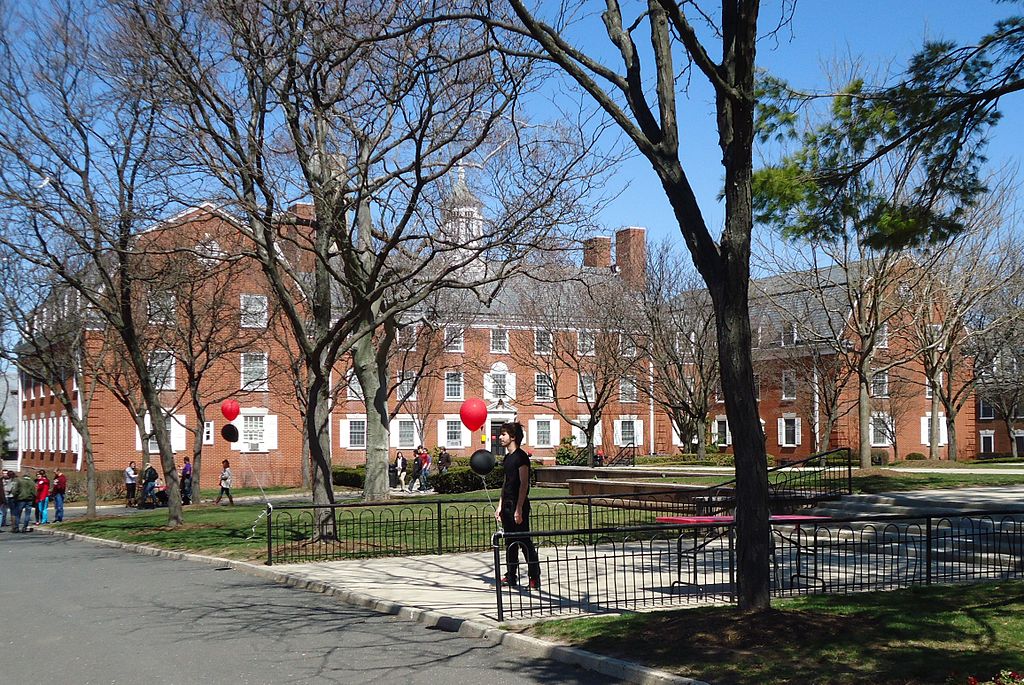Rutgers University president Robert Barchi met with state federation executives and Jewish leaders on Jan. 25 after three professors engaged in anti-Semitic or anti-Israel activities in recent months.
“The federation executives were very much concerned about how the controversy was tarnishing the reputation of Rutgers as a welcoming place for Jewish students,” New Jersey State Association of Jewish Federations executive director Jacob Toporek told NJJN.
In the months since these issues came to light, students, parents of prospective and current students, and alumni have reached out to Rutgers Hillel to discuss the perception that the New Brunswick campus is rife with anti-Semitism.
“I don’t think anti-Semitism is as serious a problem as these incidents would have you believe,” said Rutgers Hillel executive director Andrew Getraer, who attended the meeting held in Barchi’s office on the Old Queens campus. “If you asked, nine out of 10 students would tell you Rutgers is not an anti-Semitic campus, but nine out of 10 students would also tell you that they’ve experienced an anti-Semitic incident.”
Inflammatory posts were found on the Facebook page of Michael Chikindas, a professor of microbiology in the Department of Food Sciences, in late 2017. In one he wrote that Judaism is “the most racist religion in the world,” and in another that Israel is “a terrorist country,” the goal of which is “the genocidal extermination of the land’s native population, Palestinians.”
Approximately six weeks later, Chikindas was suspended from teaching core classes, required to take sensitivity training, and removed from his role as director of the department’s Center for Digestive Health.
Another faculty member, Jasbir Puar, an associate professor in the Department of Women’s and Gender Studies, has a history of anti-Israel writings, and she makes several defamatory claims about the Jewish state in her newest book, “The Right to Maim: Debility, Capacity, Disability” (Duke University Press, 2017), including writing that Israel has designated Palestinians as “available for injury.”
A third, Mazen Adi, an adjunct professor in Rutgers’ political science department, served in Syrian President Bashar al-Assad’s regime for 16 years. He claimed during a 2012 UN Security Council meeting that “international gangs led by some Israeli officials are now trafficking children’s organs.”
Barchi informed those at the Jan. 25 meeting that Adi is not currently employed at Rutgers and has not taught at the school since the summer of 2017, according to a statement from the Jewish Federation in the Heart of NJ.
Marlene Herman of Edison, who will take over from Gordon Haas as president of the State Association in July, said that at the meeting, Barchi and other university officials indicated that they were open to ongoing dialogue and suggestions on combatting anti-Semitism.
“He was patient and listened to us. He wanted to understand where we were coming from,” she said. “We understand he has to walk a tightrope with issues of free speech and tenure. We were scheduled to meet for an hour and he gave us an hour and 45 minutes, so he gave us the time to really discuss issues.”
Also in attendance was Keith Krivitzky, CEO of the Jewish Federation in the Heart of New Jersey, who said he was disappointed that it took the president so long to react to the situation. Barchi, Krivitzky said, “could have responded better and more proactively,” and acts of hate should “be called out when they happen.”
He added, “My perception coming out of this meeting is that the university administration feels it needs to manage and balance the sensitivities of many groups on campus such as the large Muslim population.”
During the meeting it was announced that Rutgers is convening a full-day symposium on diversity, inclusion, and tolerance scheduled for March 27, 2018. The symposium will address concerns about anti-Semitism and other incidents of bias and hate on campus, according to the State Association. No further details were provided.
Barchi also released a statement, in which he said Rutgers “has a fundamental commitment to provide an environment where our students can discover their passions free from fears of discrimination or religious bias. I am grateful to the members of the state federations for meeting with me to discuss strategies for combatting anti-Semitism and other forms of bigotry on our campuses.”
Others in attendance included Haas; Roy Tanzman, chairman of the Board for Rutgers Hillel; Leonard Cole, co-chair of the Jewish Agency for Israel’s Task Force on Global Anti-Semitism; and Geri Palast, executive director of the Israel Action Network.
No Rutgers students were at the meeting.


























